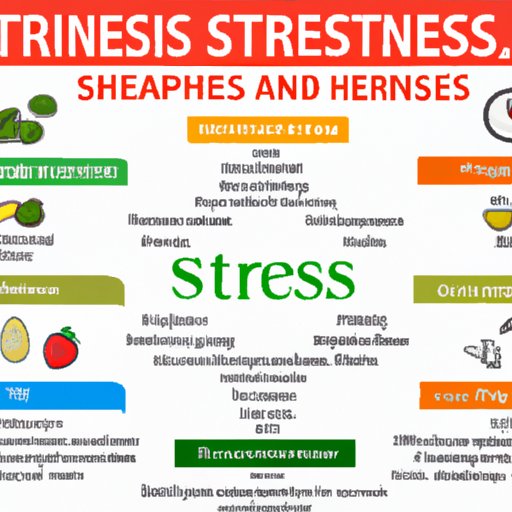
Introduction
Stress hormones such as cortisol and adrenaline play a vital role in our body’s natural stress response. They help us to stay alert and focused during challenging situations, but when they are produced in excess, they can have negative effects on our mental and physical health. Long-term exposure to high levels of stress hormones can lead to health problems such as anxiety, depression, digestive issues, and heart disease. Fortunately, there are many simple yet effective techniques that can help lower your stress hormones and promote overall health and well-being.
5 Simple Yet Effective Techniques to Lower Your Stress Hormones
1. Deep breathing exercises – Breathing deeply and slowly, filling up your lungs with air can help stimulate the parasympathetic nervous system, reducing stress hormones. Take a few deep breaths, hold for a few seconds, and release slowly.
2. Meditation and mindfulness practices – Mindfulness meditation has been shown to reduce cortisol levels. You can practice mindfulness by focusing on one thing, like your breath, and bring back your focus when your mind wanders.
3. Regular exercise – Exercise, whether it be a run or a simple walk, helps reduce stress hormones by boosting endorphin levels. It releases built-up tension and promotes relaxation as well.
4. Adequate sleep and rest – Poor sleeping habits can lead to higher levels of stress hormones. Make sure to get at least 7 hours of sleep and prioritize restful activities before bed to promote optimal sleep quality.
5. Time management and prioritization techniques – Procrastination and being overburdened with work and activities can contribute to excessive stress hormones. Prioritize important tasks, creating a schedule, and delegating can promote better time management and stress reduction.
The Ultimate Guide to Reducing Stress Hormones Naturally
1. Diet and nutrition tips for managing stress hormones – Your diet can greatly affect stress levels. Eating nutrient-rich foods that are high in antioxidants and vitamins can reduce oxidative stress that contributes to stress hormones. You can also eat foods like yogurt that contain probiotics that promote healthy gut flora linked to lower stress levels.
2. Natural supplements and herbs that can help lower stress hormones – Herbs like ashwagandha and passionflower supplements can help promote relaxation and reduce stress levels. Consult with your physician before starting any supplement regime.
3. The importance of hydration in managing stress hormones – Drinking plenty of water not only keeps you hydrated but also flushes out toxins that can lead to stress hormone build-up in your body. Hydrating enough also helps regulate your overall stress response.
4. Creating a healthy and supportive environment for stress reduction – Your work environment, living spaces, and social environment can all contribute to stress levels. Surround yourself with people and surroundings that support and promote your well-being as much as possible.
Stress Hormones Got You Down? Here’s How to Lower Them Quickly
1. Quick stress-reducing exercises and techniques – If you feel stressed, try techniques like progressive muscle relaxation, visualization, or positive affirmations.
2. Creating a calming environment – Create a relaxing environment by decluttering your home, playing calming music, or using aromatherapy oils or scents that promote relaxation.
3. Engaging in relaxation practices such as massage or aromatherapy – Further promote relaxation by getting massages, doing yoga, or trying aromatherapy/essential oils.
Say Goodbye to High Stress Hormones with These Easy Tips
1. Incorporating stress management techniques into your daily routine – Make stress management techniques like simple breathing exercises or stretching a part of your daily routine to promote long-term stress reduction.
2. Finding healthy outlets for stress such as socializing with friends or pursuing hobbies – Hobbies and social connections are important in promoting stress reduction. Opt for activities that give you a sense of accomplishment and engage you positively.
3. Prioritizing self-care and self-compassion – Paying attention to your needs, and spending time catering to things that empower and rejuvenate you and cultivating a sense of self-compassion help reduce stress chemicals and promote overall well-being.
The Top 6 Science-Backed Ways to Lower Your Stress Hormones
1. Overview of scientific research on stress reduction techniques – There is evidence that techniques like cognitive-behavioral therapy can reduce stress hormones like cortisol.
2. Explanation of evidence-based techniques such as progressive muscle relaxation – Progressive muscle relaxation helps reduce tension in your muscles and improve breathing, decreasing cortisol levels.
How to Lower Stress Hormones: A Step-by-Step Guide to Achieving Inner Calm
1. Step-by-step guide to practicing stress management techniques effectively – Implementing stress relief techniques like breathing and meditation into your daily routine is an effective way to reduce stress hormones. Create a step-by-step guide tailored to specific needs.
2. Importance of persistence and consistency in stress reduction – Reducing stress hormones is a long-term practice. Consistency and persistence in implementing these techniques are key to achieving long-term effects.
Conclusion
Managing stress hormones is crucial to maintaining overall health and well-being. By incorporating natural techniques like deep breathing, meditation, exercise, diet and nutrition and creating a calming environment into your daily routine, you can significantly lower your stress hormone levels. Remember that progress towards achieving inner calm is a process, but a consistently mindful and effective endeavor can build resilience and take one towards a stress-free future.




